外研版九年级上英语Module 1 Wonders of the world 知识讲解(含答案)
文档属性
| 名称 | 外研版九年级上英语Module 1 Wonders of the world 知识讲解(含答案) |
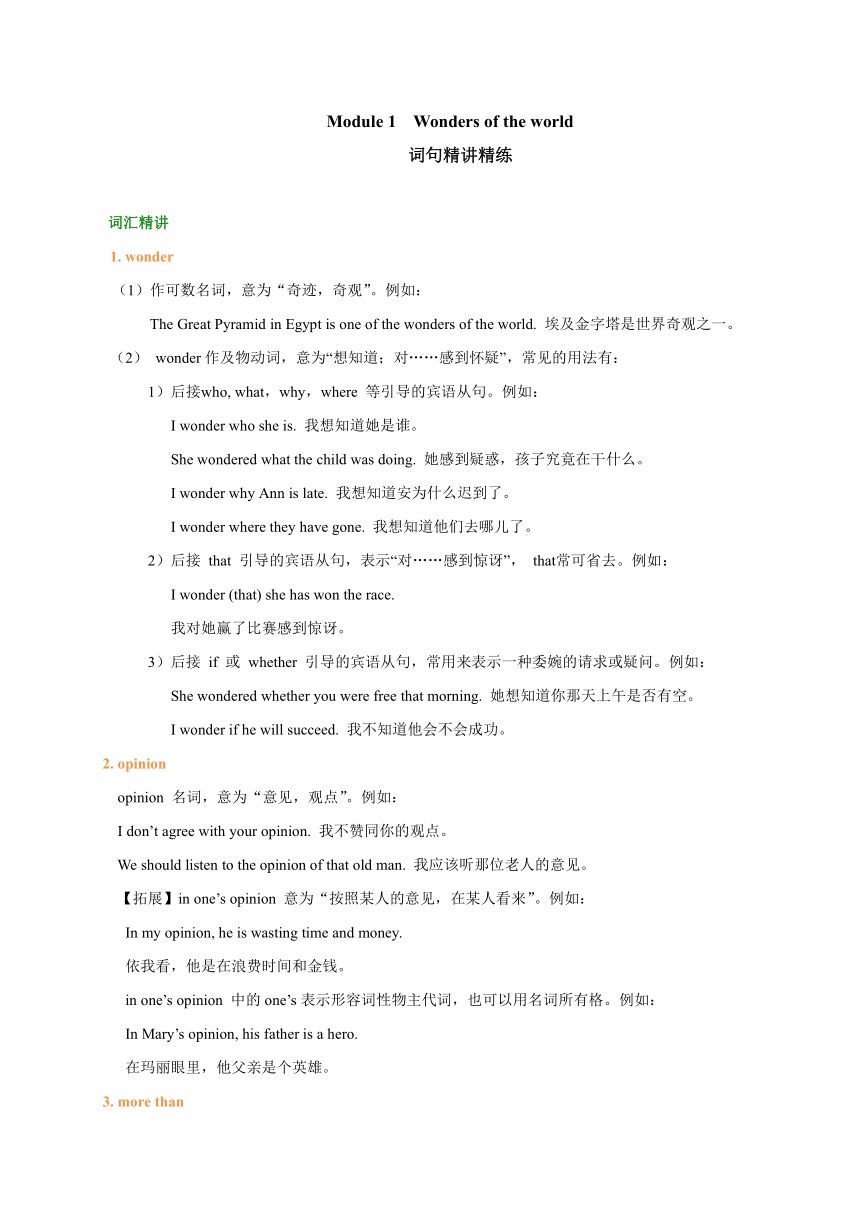
|
|
| 格式 | zip | ||
| 文件大小 | 40.3KB | ||
| 资源类型 | 教案 | ||
| 版本资源 | 外研版 | ||
| 科目 | 英语 | ||
| 更新时间 | 2020-02-14 07:50:59 | ||
图片预览

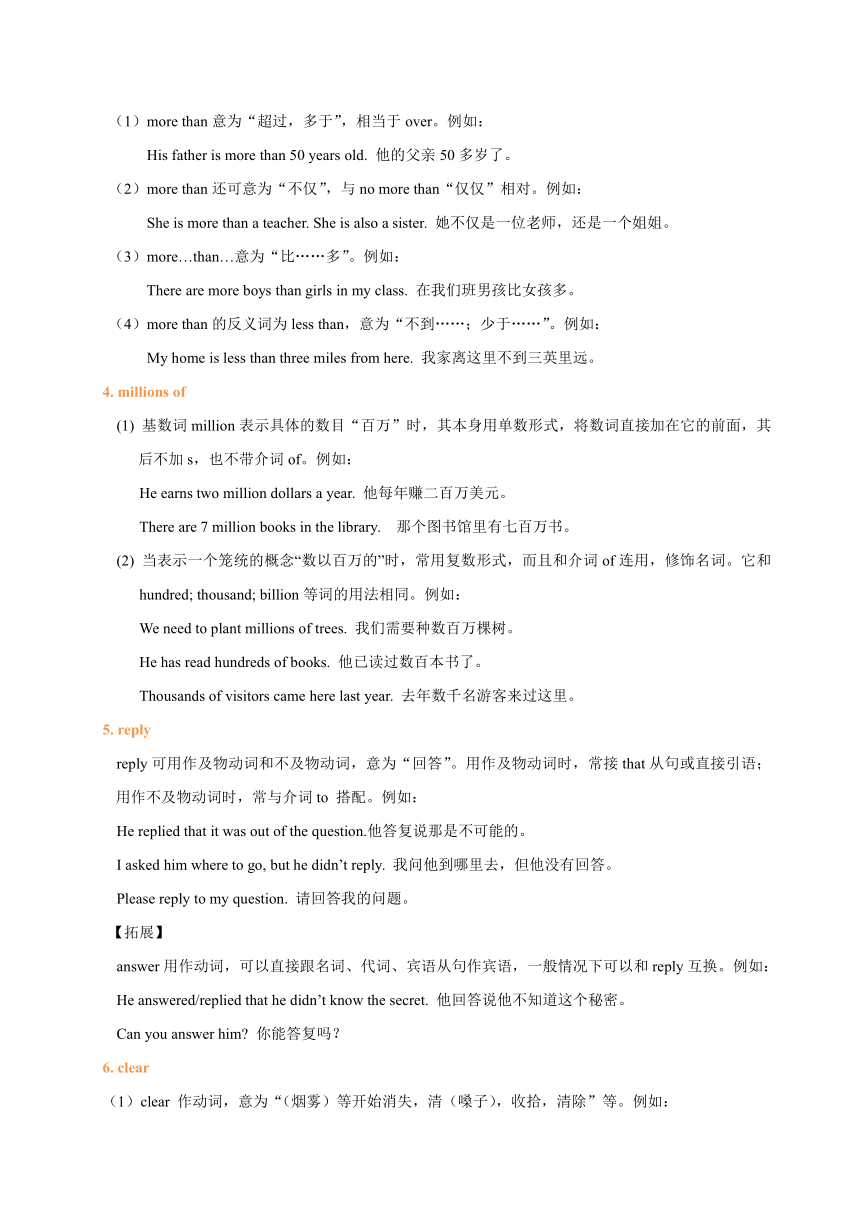
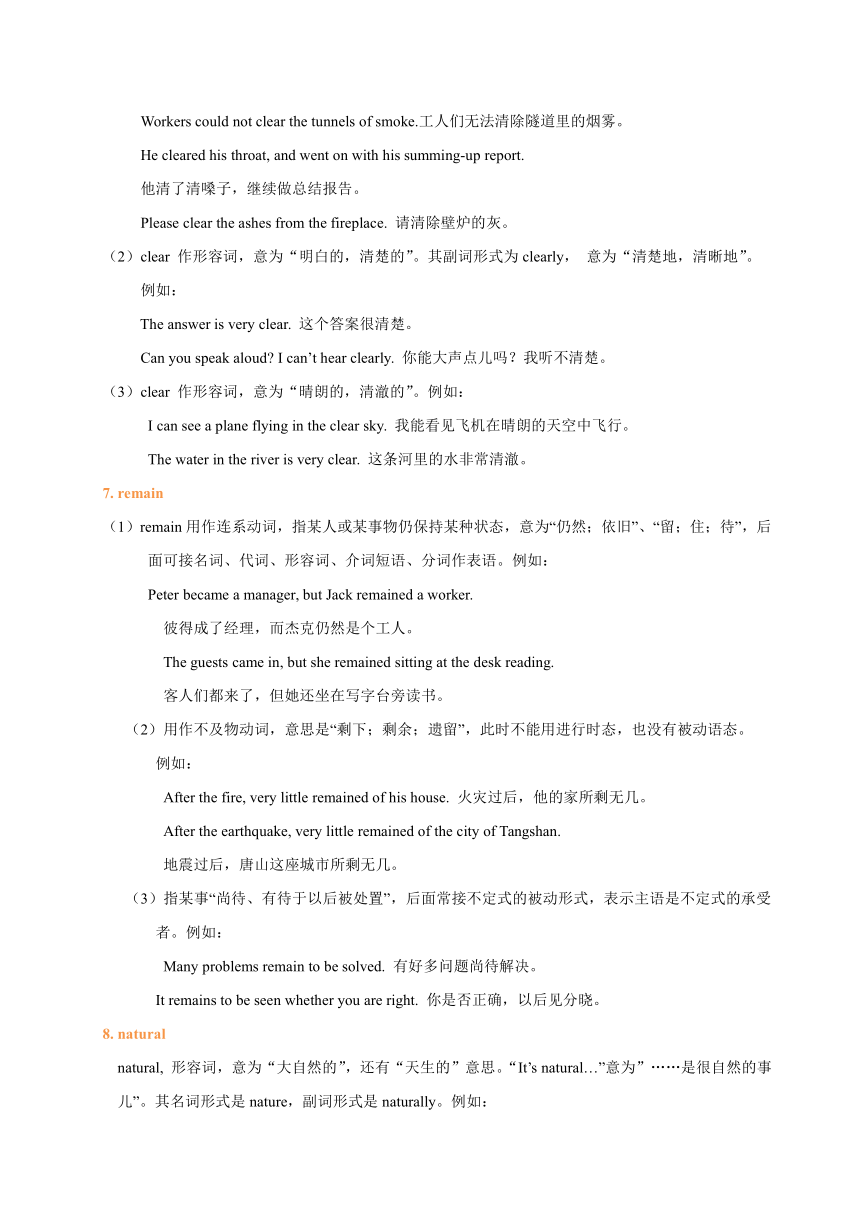
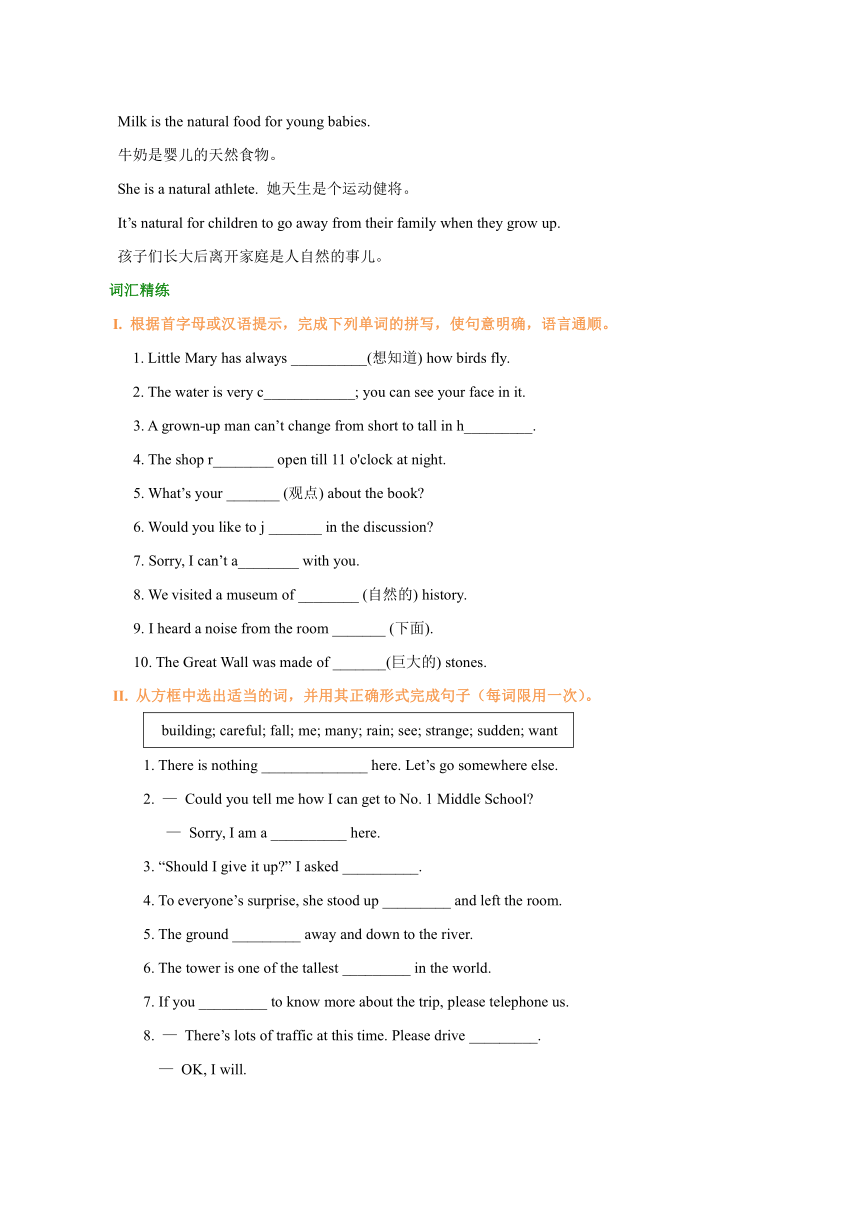
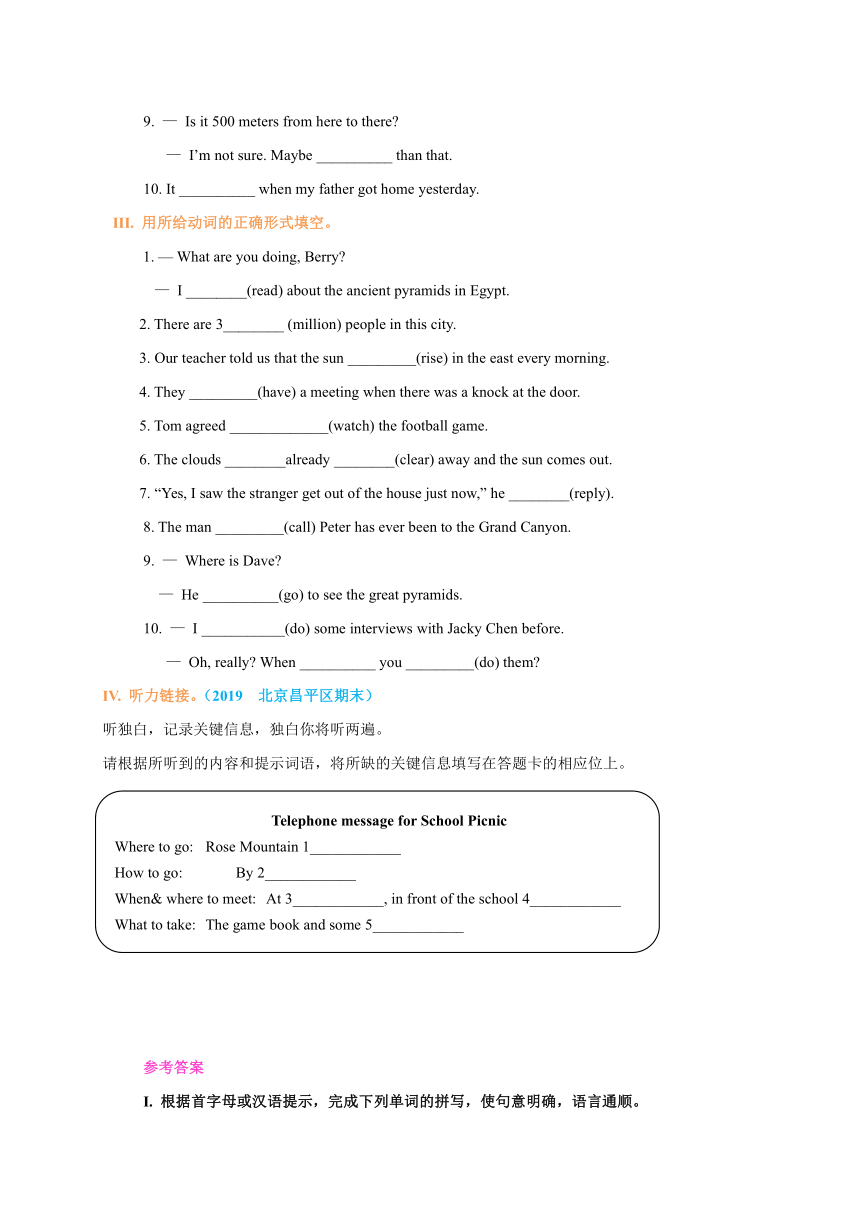
文档简介
Module 1 Wonders of the world
词句精讲精练
词汇精讲
1. wonder
(1)作可数名词,意为“奇迹,奇观”。例如:
The Great Pyramid in Egypt is one of the wonders of the world. 埃及金字塔是世界奇观之一。
(2) wonder作及物动词,意为“想知道;对……感到怀疑”,常见的用法有:
1)后接who, what,why,where 等引导的宾语从句。例如:
I wonder who she is. 我想知道她是谁。
She wondered what the child was doing. 她感到疑惑,孩子究竟在干什么。
I wonder why Ann is late. 我想知道安为什么迟到了。
I wonder where they have gone. 我想知道他们去哪儿了。
2)后接 that 引导的宾语从句,表示“对……感到惊讶”, that常可省去。例如:
I wonder (that) she has won the race.
我对她赢了比赛感到惊讶。
3)后接 if 或 whether 引导的宾语从句,常用来表示一种委婉的请求或疑问。例如:
She wondered whether you were free that morning. 她想知道你那天上午是否有空。
I wonder if he will succeed. 我不知道他会不会成功。
2. opinion
opinion 名词,意为“意见,观点”。例如:
I don’t agree with your opinion. 我不赞同你的观点。
We should listen to the opinion of that old man. 我应该听那位老人的意见。
【拓展】in one’s opinion 意为“按照某人的意见,在某人看来”。例如:
In my opinion, he is wasting time and money.
依我看,他是在浪费时间和金钱。
in one’s opinion 中的one’s表示形容词性物主代词,也可以用名词所有格。例如:
In Mary’s opinion, his father is a hero.
在玛丽眼里,他父亲是个英雄。
3. more than
(1)more than意为“超过,多于”,相当于over。例如:
His father is more than 50 years old. 他的父亲50多岁了。
(2)more than还可意为“不仅”,与no more than“仅仅”相对。例如:
She is more than a teacher. She is also a sister. 她不仅是一位老师,还是一个姐姐。
(3)more…than…意为“比……多”。例如:
There are more boys than girls in my class. 在我们班男孩比女孩多。
(4)more than的反义词为less than,意为“不到……;少于……”。例如:
My home is less than three miles from here. 我家离这里不到三英里远。
4. millions of
(1) 基数词million表示具体的数目“百万”时,其本身用单数形式,将数词直接加在它的前面,其后不加s,也不带介词of。例如:
He earns two million dollars a year. 他每年赚二百万美元。
There are 7 million books in the library. 那个图书馆里有七百万书。
(2) 当表示一个笼统的概念“数以百万的”时,常用复数形式,而且和介词of连用,修饰名词。它和hundred; thousand; billion等词的用法相同。例如:
We need to plant millions of trees. 我们需要种数百万棵树。
He has read hundreds of books. 他已读过数百本书了。
Thousands of visitors came here last year. 去年数千名游客来过这里。
5. reply
reply可用作及物动词和不及物动词,意为“回答”。用作及物动词时,常接that从句或直接引语;用作不及物动词时,常与介词to 搭配。例如:
He replied that it was out of the question.他答复说那是不可能的。
I asked him where to go, but he didn’t reply. 我问他到哪里去,但他没有回答。
Please reply to my question. 请回答我的问题。
【拓展】
answer用作动词,可以直接跟名词、代词、宾语从句作宾语,一般情况下可以和reply互换。例如:
He answered/replied that he didn’t know the secret. 他回答说他不知道这个秘密。
Can you answer him? 你能答复吗?
6. clear
(1)clear 作动词,意为“(烟雾)等开始消失,清(嗓子),收拾,清除”等。例如:
Workers could not clear the tunnels of smoke.工人们无法清除隧道里的烟雾。
He cleared his throat, and went on with his summing-up report.
他清了清嗓子,继续做总结报告。
Please clear the ashes from the fireplace. 请清除壁炉的灰。
(2)clear 作形容词,意为“明白的,清楚的”。其副词形式为clearly, 意为“清楚地,清晰地”。
例如:
The answer is very clear. 这个答案很清楚。
Can you speak aloud? I can’t hear clearly. 你能大声点儿吗?我听不清楚。
(3)clear 作形容词,意为“晴朗的,清澈的”。例如:
I can see a plane flying in the clear sky. 我能看见飞机在晴朗的天空中飞行。
The water in the river is very clear. 这条河里的水非常清澈。
7. remain
(1)remain用作连系动词,指某人或某事物仍保持某种状态,意为“仍然;依旧”、“留;住;待”,后面可接名词、代词、形容词、介词短语、分词作表语。例如: Peter became a manager, but Jack remained a worker.
彼得成了经理,而杰克仍然是个工人。 The guests came in, but she remained sitting at the desk reading. 客人们都来了,但她还坐在写字台旁读书。
(2)用作不及物动词,意思是“剩下;剩余;遗留”,此时不能用进行时态,也没有被动语态。
例如: After the fire, very little remained of his house. 火灾过后,他的家所剩无几。 After the earthquake, very little remained of the city of Tangshan. 地震过后,唐山这座城市所剩无几。
(3)指某事“尚待、有待于以后被处置”,后面常接不定式的被动形式,表示主语是不定式的承受者。例如: Many problems remain to be solved. 有好多问题尚待解决。 It remains to be seen whether you are right. 你是否正确,以后见分晓。
8. natural
natural, 形容词,意为“大自然的”,还有“天生的”意思。“It’s natural…”意为”……是很自然的事儿”。其名词形式是nature,副词形式是naturally。例如:
Milk is the natural food for young babies.
牛奶是婴儿的天然食物。
She is a natural athlete. 她天生是个运动健将。
It’s natural for children to go away from their family when they grow up.
孩子们长大后离开家庭是人自然的事儿。
词汇精练
I. 根据首字母或汉语提示,完成下列单词的拼写,使句意明确,语言通顺。
1. Little Mary has always __________(想知道) how birds fly.
2. The water is very c____________; you can see your face in it.
3. A grown-up man can’t change from short to tall in h_________.
4. The shop r________ open till 11 o'clock at night.
5. What’s your _______ (观点) about the book?
6. Would you like to j _______ in the discussion?
7. Sorry, I can’t a________ with you.
8. We visited a museum of ________ (自然的) history.
9. I heard a noise from the room _______ (下面).
10. The Great Wall was made of _______(巨大的) stones.
II. 从方框中选出适当的词,并用其正确形式完成句子(每词限用一次)。
building; careful; fall; me; many; rain; see; strange; sudden; want
1. There is nothing ______________ here. Let’s go somewhere else.
2. — Could you tell me how I can get to No. 1 Middle School?
— Sorry, I am a __________ here.
3. “Should I give it up?” I asked __________.
4. To everyone’s surprise, she stood up _________ and left the room.
5. The ground _________ away and down to the river.
6. The tower is one of the tallest _________ in the world.
7. If you _________ to know more about the trip, please telephone us.
8. — There’s lots of traffic at this time. Please drive _________.
— OK, I will.
9. — Is it 500 meters from here to there?
— I’m not sure. Maybe __________ than that.
10. It __________ when my father got home yesterday.
III. 用所给动词的正确形式填空。
1. — What are you doing, Berry?
— I ________(read) about the ancient pyramids in Egypt.
2. There are 3________ (million) people in this city.
3. Our teacher told us that the sun _________(rise) in the east every morning.
4. They _________(have) a meeting when there was a knock at the door.
5. Tom agreed _____________(watch) the football game.
6. The clouds ________already ________(clear) away and the sun comes out.
7. “Yes, I saw the stranger get out of the house just now,” he ________(reply).
8. The man _________(call) Peter has ever been to the Grand Canyon.
9. — Where is Dave?
— He __________(go) to see the great pyramids.
10. — I ___________(do) some interviews with Jacky Chen before.
— Oh, really? When __________ you _________(do) them?
IV. 听力链接。(2019 北京昌平区期末)
听独白,记录关键信息,独白你将听两遍。
请根据所听到的内容和提示词语,将所缺的关键信息填写在答题卡的相应位上。
参考答案
I. 根据首字母或汉语提示,完成下列单词的拼写,使句意明确,语言通顺。
1. wondered 2. clear 3. height 4. remains 5. opinion
6. join 7. agree 8. natural 9. below 10. huge
II. 从方框中选出适当的词,并用其正确形式完成句子(每词限用一次)。
1. to see 2. stranger 3. myself 4. suddenly 5. fell
6. buildings 7. want 8. carefully 9. more 10. was raining
III. 用所给动词的正确形式填空。
1. am reading 2. million 3. rises 4. were having 5. to watch
6. have; cleared 7. replied 8. called 9. has gone 10. have done; did; do
IV. 听力链接。
听力材料及答案:
1. Park 2. bike 3. 8:30 4. gate 5. apples
听独白,记录关键信息。独白读两遍。
( di du — answering machine says)
M: Hello, this is Bill. I’m not at home at the moment. Please leave a message when there’s a need. Thank you.
W: Hello, Bill. This is Mary. I’m calling to remind you we’re going to the Rose Mountain Park to have our school picnic tomorrow. The park is not so far, so we’ll go by bike. That’s to say, we can enjoy the beautiful scenes along the way. Mr. Brown will be waiting for us at 8:30 in front of our school gate. Make sure that you come on time! He doesn’t like being late! By the way, don’t forget to take the game book and some apples with you. We’ll play some interesting apple games there. I hope our team will win! It’s important for us to win this time because we won’t have another chance to beat the others in this term! See you tomorrow morning, then.
句式精讲
1. Let’s call Wonders of the World and join in the discussion.
join in指参加某项比赛或活动,常用于口语中,也可用于join sb in (doing) sth 意为“加入……(做)……”。例如:
May I join in the football match? 我可以参加这场足球比赛吗?
【拓展】
(1)join指加入某党派、某组织或某社会团体,以及参军等,并成为其中一员。例如:
I joined the army in 1996. 我是1996年参军的。
(2)take part in指参加群众性的活动、会议、劳动、游行等,往往指参加者持有积极的态度,起一定作用,有时与join in互换。例如:
I didn’t take part in the sports meeting yesterday because I was ill.
我没有参加昨天的运动会,因为我病了。
(3)attend 是正式用语,为及物动词,指参加会议、婚礼、典礼、去上课、上学、听报告等。句子的主语只是去听,去看,自己不一定起积极作用。例如:
He’ll attend an important meeting tomorrow. 他明天要参加一个重要会议。
2. Hmm, I’ve never seen it, so I’m not sure…
be sure=make sure,意思是“确信”,be not sure意为“不确信……”。它的后面可以用宾语从句,也可以用动词不定式。
(1)be sure of sth 对某事很确定
I am sure of his guilt.我确定他有罪。
I am sure of his coming. 我确定他会来。
(2)be sure to do sth 一定会做某事
I am sure to close the window after school. 放学后我一定会关窗的。
I am sure to help you tomorrow.我明天一定会帮你。
(3)be sure that从句 对某事很确定
I am sure that he will achieve his goal. 我确定他会实现目标的。
He is sure that his mother will come to see him this afternoon.
他确信今天下午他妈妈会来看他。
3. I agree with you, Betty.
agree单独使用,表示“同意、答应”等。例如:
I asked him to help me and he agreed. 我请求他帮忙,他答应了。 ?
【辨析】agree with, agree to, agree on (1)agree with: 1)表示同意某人或某人的意见、想法、解释等 (即持同一观点)。例如: I don't agree with you. 我不同意你的意见。 2)表示“ (食物、天气、工作等)对……适宜”。例如: The weather does not agree with me. 这种天气对我不适宜。 3)表示“与……一致”。例如: A verb must agree with its subject in person and number. 动词必须和它的主语在人称和数方面保持一致。
(2)agree to: 主要用来表示一方提出一项建议、安排、计划等,另一方同意协作。例如: We agreed to their arrangement.我们同意了他们的安排。 (3)agree on (upon): 1)主要指双方通过协商而取得一致意见或达成协议。例如: We agreed on the price. 我们就价格达成了一致意见。 2)后接动名词 (=agree to do sth.) 例如: He agreed on lending (=to lend) us some money. 他同意借给我们一些钱。
4. It’s about 1,700 meters wide and 100 meters high.
表示某物的长宽高常用: sth. + be +数词 + 单位 + 形容词
例如:This building is 20 meters high. 这栋大楼20米高。
This man is eighty years old now. 这位老人有80岁高龄了。
This snake is more than three meters long. 这条蛇足有三米多长。
【注意】可以将后面的名词和单位变成复合形容词,放于名词前修饰名词。例如:
The eighty-year-old man is very healthy and energetic.
这位八十岁的老人很健康而且充满活力。
5. There was nothing to see…
to see是动词不定式结构,在句中作定语,修饰不定代词nothing,不定式在句中做定语通常做后置定语,即放在被修饰名词或代词后。它通常有以下几种用法:
(1)不定式常可用来修饰物,表示要做某事。例如:
The next train to arrive was from New York.下一列到站的火车是从纽约开来的。
I have nothing to say on this question.在这个问题上,我没有什么话要说。
We are looking for somewhere to live.我们正在找一个地方住。
(2)不定式还可用来修饰人。例如:
He was the first guest to arrive.他是第一个到达的客人。
Miss Brown was the next person to rise to speak.布朗小姐是下一个起来发言的人。
He was a brave man to do what he did.他是个勇者才有这样的行为。
(3)很多特定的名词后也可用不定式作定语,这样的名词常用的有:way,time,reason,chance,opportunity,need,wish,effort,right,ambition等。例如:
It’s time for you to get up and go to school.你该起床去上学了。
There is no reason to doubt his word.没有理由怀疑他的话。
They have now an opportunity to go abroad to study further.他们现在有机会出国深造。
句式精练
I. 用join, join in, take part in或者attend填空。
1. Did you ______ the game?
2. How many countries _______ the last Olympic Games?
3. He _______ the Party last year.
4. I will _______ a wedding with my mother on Sunday.
II. 根据汉语提示,完成英语句子(每空一词)。
1. 中国的长城是古代的奇迹之一。
The Great Wall in China is __________ _________ the ________ of the ________ world.
2. 不要把这件事告诉其他任何人。
Don’t tell ________ _______ about this.
3. 怀特先生从他的汽车里出来,走进了一家商店。
Mr. White ________ ________ _________ his car and walked into a shop.
4. 你必须把房屋建得尽可能结实。
You must build the houses __________ ___________ __________ ___________.
5. 大峡谷有300多米高,100多米宽。
The Grand Canyon is more than_______ _______ ______ and more than 100 meters wide.
6. 关于多建一些学校一事, 你同意我的意见吗?
Do you ________ ________me about the need for more schools?
7. 我确信他明天不会来。
I’m _______ that he ________ ________ tomorrow.
8. 他2000年参军
He ________ the _______ in 2000.
9. 我很渴望再一次见到你。
I am ________ ________ ________ seeing you again.
10. 每年数以千计的人来这里观光。
Every year _________ _________ people visit the city.
III. 句型转换,每空一词。
1. The last dinosaurs died more than 60 million years ago. (对划线部分提问)
______ ______ the last dinosaurs _______?
2. I don’t know how I can swim well. (改为简单句)
I don’t know ______________ ______________ ______________ well.
3. The Kings have lived in China for 30 years. (改为同义句)
The Kings have lived in China ______________ ______________ ______________ ______________.
4. Where does he live? Can you tell me? (合并为一句)
Can you tell me ______________ he ______________?
5. I hope that I will get good grade soon. (改为同义句)
I hope ______________ ______________ good grades soon.
6. A large number of people came to visit the Summer Palace. (对划线部分提问)
_______ _______ people came to visit the Summer Palace?
IV. 补全对话。(2019黄冈市中考)
根据语境,用恰当的话语完成对话。
(A)
A: Hey, Bill, ______(1)?
B: Oh, I’m thinking about life in the countryside.
A: ________(2)?
B: Yeah, I like it very much. In the countryside, the air is fresh, the sky is bluer, and there are
also green trees and clearer rivers.
A: It’s quieter, too. People can enjoy the beauties of nature there.
(B)
A: ______(3)!
B: So it is. The wind is blowing strongly with lots of sand. I couldn’t see anything, and my
face hurt while I was walking down the street just now.
A: I’m sorry to hear that. But ______(4)?
B: People have cut down too many trees. As a result, lots of rich land has changed into
desert.
A: That’s too bad, but______(5)?
B: Trees can stop the wind from blowing the earth away. And a lot of water can be saved by
forests. They can also prevent the water from washing the earth away.
参考答案
I. 用join, join in, take part in或者attend填空。
1. join in 2. took part in 3. joined 4. attend
II. 根据汉语提示,完成英语句子(每空一词)。
1. one of; wonders; ancient 2. anyone else 3. got out of 4. as strong as possible
5. 300 meters high 6. agree with 7. sure, won’t come 8. joined, army
9. looking forward to 10. thousands of
III. 句型转换,每空一词。
1. When did, die 2. how to swim 3. since 30 years ago 4. where; lives 5. to get
6. How many
IV. 补全对话。
根据语境,用恰当的话语完成对话。
1. what are you thinking of / about?
2. Do you like the countryside/ Do you like it?
3. What bad weather!/ How bad the weather is!/ What a terrible sandstorm!
4. what has caused/made it (the bad weather/ the sandstorms)?
5. how do trees influence/ affect the weather?
词句精讲精练
词汇精讲
1. wonder
(1)作可数名词,意为“奇迹,奇观”。例如:
The Great Pyramid in Egypt is one of the wonders of the world. 埃及金字塔是世界奇观之一。
(2) wonder作及物动词,意为“想知道;对……感到怀疑”,常见的用法有:
1)后接who, what,why,where 等引导的宾语从句。例如:
I wonder who she is. 我想知道她是谁。
She wondered what the child was doing. 她感到疑惑,孩子究竟在干什么。
I wonder why Ann is late. 我想知道安为什么迟到了。
I wonder where they have gone. 我想知道他们去哪儿了。
2)后接 that 引导的宾语从句,表示“对……感到惊讶”, that常可省去。例如:
I wonder (that) she has won the race.
我对她赢了比赛感到惊讶。
3)后接 if 或 whether 引导的宾语从句,常用来表示一种委婉的请求或疑问。例如:
She wondered whether you were free that morning. 她想知道你那天上午是否有空。
I wonder if he will succeed. 我不知道他会不会成功。
2. opinion
opinion 名词,意为“意见,观点”。例如:
I don’t agree with your opinion. 我不赞同你的观点。
We should listen to the opinion of that old man. 我应该听那位老人的意见。
【拓展】in one’s opinion 意为“按照某人的意见,在某人看来”。例如:
In my opinion, he is wasting time and money.
依我看,他是在浪费时间和金钱。
in one’s opinion 中的one’s表示形容词性物主代词,也可以用名词所有格。例如:
In Mary’s opinion, his father is a hero.
在玛丽眼里,他父亲是个英雄。
3. more than
(1)more than意为“超过,多于”,相当于over。例如:
His father is more than 50 years old. 他的父亲50多岁了。
(2)more than还可意为“不仅”,与no more than“仅仅”相对。例如:
She is more than a teacher. She is also a sister. 她不仅是一位老师,还是一个姐姐。
(3)more…than…意为“比……多”。例如:
There are more boys than girls in my class. 在我们班男孩比女孩多。
(4)more than的反义词为less than,意为“不到……;少于……”。例如:
My home is less than three miles from here. 我家离这里不到三英里远。
4. millions of
(1) 基数词million表示具体的数目“百万”时,其本身用单数形式,将数词直接加在它的前面,其后不加s,也不带介词of。例如:
He earns two million dollars a year. 他每年赚二百万美元。
There are 7 million books in the library. 那个图书馆里有七百万书。
(2) 当表示一个笼统的概念“数以百万的”时,常用复数形式,而且和介词of连用,修饰名词。它和hundred; thousand; billion等词的用法相同。例如:
We need to plant millions of trees. 我们需要种数百万棵树。
He has read hundreds of books. 他已读过数百本书了。
Thousands of visitors came here last year. 去年数千名游客来过这里。
5. reply
reply可用作及物动词和不及物动词,意为“回答”。用作及物动词时,常接that从句或直接引语;用作不及物动词时,常与介词to 搭配。例如:
He replied that it was out of the question.他答复说那是不可能的。
I asked him where to go, but he didn’t reply. 我问他到哪里去,但他没有回答。
Please reply to my question. 请回答我的问题。
【拓展】
answer用作动词,可以直接跟名词、代词、宾语从句作宾语,一般情况下可以和reply互换。例如:
He answered/replied that he didn’t know the secret. 他回答说他不知道这个秘密。
Can you answer him? 你能答复吗?
6. clear
(1)clear 作动词,意为“(烟雾)等开始消失,清(嗓子),收拾,清除”等。例如:
Workers could not clear the tunnels of smoke.工人们无法清除隧道里的烟雾。
He cleared his throat, and went on with his summing-up report.
他清了清嗓子,继续做总结报告。
Please clear the ashes from the fireplace. 请清除壁炉的灰。
(2)clear 作形容词,意为“明白的,清楚的”。其副词形式为clearly, 意为“清楚地,清晰地”。
例如:
The answer is very clear. 这个答案很清楚。
Can you speak aloud? I can’t hear clearly. 你能大声点儿吗?我听不清楚。
(3)clear 作形容词,意为“晴朗的,清澈的”。例如:
I can see a plane flying in the clear sky. 我能看见飞机在晴朗的天空中飞行。
The water in the river is very clear. 这条河里的水非常清澈。
7. remain
(1)remain用作连系动词,指某人或某事物仍保持某种状态,意为“仍然;依旧”、“留;住;待”,后面可接名词、代词、形容词、介词短语、分词作表语。例如: Peter became a manager, but Jack remained a worker.
彼得成了经理,而杰克仍然是个工人。 The guests came in, but she remained sitting at the desk reading. 客人们都来了,但她还坐在写字台旁读书。
(2)用作不及物动词,意思是“剩下;剩余;遗留”,此时不能用进行时态,也没有被动语态。
例如: After the fire, very little remained of his house. 火灾过后,他的家所剩无几。 After the earthquake, very little remained of the city of Tangshan. 地震过后,唐山这座城市所剩无几。
(3)指某事“尚待、有待于以后被处置”,后面常接不定式的被动形式,表示主语是不定式的承受者。例如: Many problems remain to be solved. 有好多问题尚待解决。 It remains to be seen whether you are right. 你是否正确,以后见分晓。
8. natural
natural, 形容词,意为“大自然的”,还有“天生的”意思。“It’s natural…”意为”……是很自然的事儿”。其名词形式是nature,副词形式是naturally。例如:
Milk is the natural food for young babies.
牛奶是婴儿的天然食物。
She is a natural athlete. 她天生是个运动健将。
It’s natural for children to go away from their family when they grow up.
孩子们长大后离开家庭是人自然的事儿。
词汇精练
I. 根据首字母或汉语提示,完成下列单词的拼写,使句意明确,语言通顺。
1. Little Mary has always __________(想知道) how birds fly.
2. The water is very c____________; you can see your face in it.
3. A grown-up man can’t change from short to tall in h_________.
4. The shop r________ open till 11 o'clock at night.
5. What’s your _______ (观点) about the book?
6. Would you like to j _______ in the discussion?
7. Sorry, I can’t a________ with you.
8. We visited a museum of ________ (自然的) history.
9. I heard a noise from the room _______ (下面).
10. The Great Wall was made of _______(巨大的) stones.
II. 从方框中选出适当的词,并用其正确形式完成句子(每词限用一次)。
building; careful; fall; me; many; rain; see; strange; sudden; want
1. There is nothing ______________ here. Let’s go somewhere else.
2. — Could you tell me how I can get to No. 1 Middle School?
— Sorry, I am a __________ here.
3. “Should I give it up?” I asked __________.
4. To everyone’s surprise, she stood up _________ and left the room.
5. The ground _________ away and down to the river.
6. The tower is one of the tallest _________ in the world.
7. If you _________ to know more about the trip, please telephone us.
8. — There’s lots of traffic at this time. Please drive _________.
— OK, I will.
9. — Is it 500 meters from here to there?
— I’m not sure. Maybe __________ than that.
10. It __________ when my father got home yesterday.
III. 用所给动词的正确形式填空。
1. — What are you doing, Berry?
— I ________(read) about the ancient pyramids in Egypt.
2. There are 3________ (million) people in this city.
3. Our teacher told us that the sun _________(rise) in the east every morning.
4. They _________(have) a meeting when there was a knock at the door.
5. Tom agreed _____________(watch) the football game.
6. The clouds ________already ________(clear) away and the sun comes out.
7. “Yes, I saw the stranger get out of the house just now,” he ________(reply).
8. The man _________(call) Peter has ever been to the Grand Canyon.
9. — Where is Dave?
— He __________(go) to see the great pyramids.
10. — I ___________(do) some interviews with Jacky Chen before.
— Oh, really? When __________ you _________(do) them?
IV. 听力链接。(2019 北京昌平区期末)
听独白,记录关键信息,独白你将听两遍。
请根据所听到的内容和提示词语,将所缺的关键信息填写在答题卡的相应位上。
参考答案
I. 根据首字母或汉语提示,完成下列单词的拼写,使句意明确,语言通顺。
1. wondered 2. clear 3. height 4. remains 5. opinion
6. join 7. agree 8. natural 9. below 10. huge
II. 从方框中选出适当的词,并用其正确形式完成句子(每词限用一次)。
1. to see 2. stranger 3. myself 4. suddenly 5. fell
6. buildings 7. want 8. carefully 9. more 10. was raining
III. 用所给动词的正确形式填空。
1. am reading 2. million 3. rises 4. were having 5. to watch
6. have; cleared 7. replied 8. called 9. has gone 10. have done; did; do
IV. 听力链接。
听力材料及答案:
1. Park 2. bike 3. 8:30 4. gate 5. apples
听独白,记录关键信息。独白读两遍。
( di du — answering machine says)
M: Hello, this is Bill. I’m not at home at the moment. Please leave a message when there’s a need. Thank you.
W: Hello, Bill. This is Mary. I’m calling to remind you we’re going to the Rose Mountain Park to have our school picnic tomorrow. The park is not so far, so we’ll go by bike. That’s to say, we can enjoy the beautiful scenes along the way. Mr. Brown will be waiting for us at 8:30 in front of our school gate. Make sure that you come on time! He doesn’t like being late! By the way, don’t forget to take the game book and some apples with you. We’ll play some interesting apple games there. I hope our team will win! It’s important for us to win this time because we won’t have another chance to beat the others in this term! See you tomorrow morning, then.
句式精讲
1. Let’s call Wonders of the World and join in the discussion.
join in指参加某项比赛或活动,常用于口语中,也可用于join sb in (doing) sth 意为“加入……(做)……”。例如:
May I join in the football match? 我可以参加这场足球比赛吗?
【拓展】
(1)join指加入某党派、某组织或某社会团体,以及参军等,并成为其中一员。例如:
I joined the army in 1996. 我是1996年参军的。
(2)take part in指参加群众性的活动、会议、劳动、游行等,往往指参加者持有积极的态度,起一定作用,有时与join in互换。例如:
I didn’t take part in the sports meeting yesterday because I was ill.
我没有参加昨天的运动会,因为我病了。
(3)attend 是正式用语,为及物动词,指参加会议、婚礼、典礼、去上课、上学、听报告等。句子的主语只是去听,去看,自己不一定起积极作用。例如:
He’ll attend an important meeting tomorrow. 他明天要参加一个重要会议。
2. Hmm, I’ve never seen it, so I’m not sure…
be sure=make sure,意思是“确信”,be not sure意为“不确信……”。它的后面可以用宾语从句,也可以用动词不定式。
(1)be sure of sth 对某事很确定
I am sure of his guilt.我确定他有罪。
I am sure of his coming. 我确定他会来。
(2)be sure to do sth 一定会做某事
I am sure to close the window after school. 放学后我一定会关窗的。
I am sure to help you tomorrow.我明天一定会帮你。
(3)be sure that从句 对某事很确定
I am sure that he will achieve his goal. 我确定他会实现目标的。
He is sure that his mother will come to see him this afternoon.
他确信今天下午他妈妈会来看他。
3. I agree with you, Betty.
agree单独使用,表示“同意、答应”等。例如:
I asked him to help me and he agreed. 我请求他帮忙,他答应了。 ?
【辨析】agree with, agree to, agree on (1)agree with: 1)表示同意某人或某人的意见、想法、解释等 (即持同一观点)。例如: I don't agree with you. 我不同意你的意见。 2)表示“ (食物、天气、工作等)对……适宜”。例如: The weather does not agree with me. 这种天气对我不适宜。 3)表示“与……一致”。例如: A verb must agree with its subject in person and number. 动词必须和它的主语在人称和数方面保持一致。
(2)agree to: 主要用来表示一方提出一项建议、安排、计划等,另一方同意协作。例如: We agreed to their arrangement.我们同意了他们的安排。 (3)agree on (upon): 1)主要指双方通过协商而取得一致意见或达成协议。例如: We agreed on the price. 我们就价格达成了一致意见。 2)后接动名词 (=agree to do sth.) 例如: He agreed on lending (=to lend) us some money. 他同意借给我们一些钱。
4. It’s about 1,700 meters wide and 100 meters high.
表示某物的长宽高常用: sth. + be +数词 + 单位 + 形容词
例如:This building is 20 meters high. 这栋大楼20米高。
This man is eighty years old now. 这位老人有80岁高龄了。
This snake is more than three meters long. 这条蛇足有三米多长。
【注意】可以将后面的名词和单位变成复合形容词,放于名词前修饰名词。例如:
The eighty-year-old man is very healthy and energetic.
这位八十岁的老人很健康而且充满活力。
5. There was nothing to see…
to see是动词不定式结构,在句中作定语,修饰不定代词nothing,不定式在句中做定语通常做后置定语,即放在被修饰名词或代词后。它通常有以下几种用法:
(1)不定式常可用来修饰物,表示要做某事。例如:
The next train to arrive was from New York.下一列到站的火车是从纽约开来的。
I have nothing to say on this question.在这个问题上,我没有什么话要说。
We are looking for somewhere to live.我们正在找一个地方住。
(2)不定式还可用来修饰人。例如:
He was the first guest to arrive.他是第一个到达的客人。
Miss Brown was the next person to rise to speak.布朗小姐是下一个起来发言的人。
He was a brave man to do what he did.他是个勇者才有这样的行为。
(3)很多特定的名词后也可用不定式作定语,这样的名词常用的有:way,time,reason,chance,opportunity,need,wish,effort,right,ambition等。例如:
It’s time for you to get up and go to school.你该起床去上学了。
There is no reason to doubt his word.没有理由怀疑他的话。
They have now an opportunity to go abroad to study further.他们现在有机会出国深造。
句式精练
I. 用join, join in, take part in或者attend填空。
1. Did you ______ the game?
2. How many countries _______ the last Olympic Games?
3. He _______ the Party last year.
4. I will _______ a wedding with my mother on Sunday.
II. 根据汉语提示,完成英语句子(每空一词)。
1. 中国的长城是古代的奇迹之一。
The Great Wall in China is __________ _________ the ________ of the ________ world.
2. 不要把这件事告诉其他任何人。
Don’t tell ________ _______ about this.
3. 怀特先生从他的汽车里出来,走进了一家商店。
Mr. White ________ ________ _________ his car and walked into a shop.
4. 你必须把房屋建得尽可能结实。
You must build the houses __________ ___________ __________ ___________.
5. 大峡谷有300多米高,100多米宽。
The Grand Canyon is more than_______ _______ ______ and more than 100 meters wide.
6. 关于多建一些学校一事, 你同意我的意见吗?
Do you ________ ________me about the need for more schools?
7. 我确信他明天不会来。
I’m _______ that he ________ ________ tomorrow.
8. 他2000年参军
He ________ the _______ in 2000.
9. 我很渴望再一次见到你。
I am ________ ________ ________ seeing you again.
10. 每年数以千计的人来这里观光。
Every year _________ _________ people visit the city.
III. 句型转换,每空一词。
1. The last dinosaurs died more than 60 million years ago. (对划线部分提问)
______ ______ the last dinosaurs _______?
2. I don’t know how I can swim well. (改为简单句)
I don’t know ______________ ______________ ______________ well.
3. The Kings have lived in China for 30 years. (改为同义句)
The Kings have lived in China ______________ ______________ ______________ ______________.
4. Where does he live? Can you tell me? (合并为一句)
Can you tell me ______________ he ______________?
5. I hope that I will get good grade soon. (改为同义句)
I hope ______________ ______________ good grades soon.
6. A large number of people came to visit the Summer Palace. (对划线部分提问)
_______ _______ people came to visit the Summer Palace?
IV. 补全对话。(2019黄冈市中考)
根据语境,用恰当的话语完成对话。
(A)
A: Hey, Bill, ______(1)?
B: Oh, I’m thinking about life in the countryside.
A: ________(2)?
B: Yeah, I like it very much. In the countryside, the air is fresh, the sky is bluer, and there are
also green trees and clearer rivers.
A: It’s quieter, too. People can enjoy the beauties of nature there.
(B)
A: ______(3)!
B: So it is. The wind is blowing strongly with lots of sand. I couldn’t see anything, and my
face hurt while I was walking down the street just now.
A: I’m sorry to hear that. But ______(4)?
B: People have cut down too many trees. As a result, lots of rich land has changed into
desert.
A: That’s too bad, but______(5)?
B: Trees can stop the wind from blowing the earth away. And a lot of water can be saved by
forests. They can also prevent the water from washing the earth away.
参考答案
I. 用join, join in, take part in或者attend填空。
1. join in 2. took part in 3. joined 4. attend
II. 根据汉语提示,完成英语句子(每空一词)。
1. one of; wonders; ancient 2. anyone else 3. got out of 4. as strong as possible
5. 300 meters high 6. agree with 7. sure, won’t come 8. joined, army
9. looking forward to 10. thousands of
III. 句型转换,每空一词。
1. When did, die 2. how to swim 3. since 30 years ago 4. where; lives 5. to get
6. How many
IV. 补全对话。
根据语境,用恰当的话语完成对话。
1. what are you thinking of / about?
2. Do you like the countryside/ Do you like it?
3. What bad weather!/ How bad the weather is!/ What a terrible sandstorm!
4. what has caused/made it (the bad weather/ the sandstorms)?
5. how do trees influence/ affect the weather?
同课章节目录
- Module 1 Wonders of the world
- Unit 1 It's more than 2,000 years old.
- Unit 2 The Grand Canyon was not just big.
- Unit 3 Language in use
- Module 2 Public holidays
- Unit 1 My family always go somewhere interesting a
- Unit 2 We have celebrated the festival since the f
- Unit 3 Language in use
- Module 3 Heroes
- Unit 1 She trained hard,so she became a great play
- Unit 2There were few doctors, so he had to work ve
- Unit 3 Language in use
- Module 4 Home alone
- Unit 1 I can look after myself, although it won’t
- Unit 2 I became so bored with their orders that I
- Unit 3 Language in use
- Module 5 Museums
- Unit 1 Don't cross that rope!
- Unit 2 If you ever go to London, make sure you vis
- Unit 3 Language in use
- Module 6 Problems
- Unit 1 If I start after dinner, I'll finish it be
- Unit 2 If you tell him the truth now, you will sho
- Unit 3 Language in use
- Revision Module A
- Module 7 Great books
- Unit 1 We're still influenced by Confucius's idea
- Unit 2 It is still read and loved.
- Unit 3 Language in use
- Module 8 Sports life
- Unit 1 Daming wasn't chosen for the team last time
- Unit 2 He was invited to competitions around the w
- Unit 3 Language in use
- Module 9 Great inventions
- Unit 1 Will computers be used more than books in t
- Unit 2 Will books be replaced by the Internet?
- Unit 3 Language in use
- Module 10 Australia
- Unit 1 I have some photos that I took in Australia
- Unit 2 The game that they like most is Australian
- Unit 3 Language in use
- Module 11 Photos
- Unit 1 He's the boy who won the photo competition
- Unit 2 The photo which we liked best was taken by
- Unit 3 Language in use
- Module 12 Save our world
- Unit 1 If everyone starts to do something, the wor
- Unit 2 Repeat these three words daily: reduce, reu
- Unit 3 Language in use
- Revision Module B
